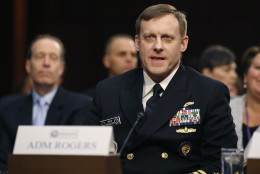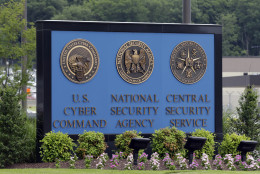Cyber Command
-
Leaders of the Senate Armed Services Committee intend to push legislation promoting U.S. Cyber Command to a full combatant command. CYBERCOM's current commander agrees it's time to do so.
April 06, 2016 -
Adm. Mike Rogers, commander of U.S. Cyber Command and director of the National Security Agency, told Congress that increased investments in cybersecurity are a reflection of the world we live in, responding to Representatives concerned about rising budget deficits and potential future cuts to DoD.
March 17, 2016 -
The National Security Agency is preparing for an organizational change that will prepare future leaders for global threats.
December 16, 2015 -
With the defense authorization bill poised for President Obama's signature, Federal News Radio looks at certain provisions that will impact federal workers.
November 11, 2015 -
U.S. Cyber Command hopes to increase the defensive posture of its networks by imposing more accountability on commanders. Future scorecards will grade local installations. Those with failing grades may face sanctions.
September 21, 2015 -
Responding to cyber penetrations into federal IT systems at the Office of Personnel Management and elsewhere, the Office of the Director of National Intelligence said Wednesday that it was launching a “comprehensive” and governmentwide counterintelligence campaign.
September 10, 2015 -
The head of U.S. Cyber Command says he wants to create an effective early warning system for cyberspace. But to do it effectively, he says he needs more voluntary sharing of cyber threat information between the federal government and commercial companies.
July 28, 2015 -
The commander of US Cyber Command says he wants to create an effective early warning system for cyberspace – potentially ringing alarm bells when foreign adversaries are preparing attacks on government, or even private networks. But to do it, he says he needs more voluntary sharing of cyber threat information between the federal government and commercial companies. More from Federal News Radio’s DoD reporter Jared Serbu.
July 24, 2015 -
The Pentagon’s newest cyber organization is poised to take a key step in its maturation over the next several weeks as it branches out from Fort Meade and into three new branch offices designed to help defend DoD systems in various geographic areas.
July 06, 2015 -
The Director of National Intelligence is the first administration official to publicly attribute the OPM breach to China, and says intelligence agencies would have engaged in similar operations if given the opportunity.
June 26, 2015 -
The Senate packed a lot into its version of the 2016 Defense authorization bill before final passage Thursday afternoon, and in a notable break from recent history, the full package passed well before the start of the new fiscal year.
June 22, 2015 -
The Pentagon\'s newest cybersecurity organization -- Joint Force Headquarters-DoD Information Networks -- is beginning to take over some of the responsibilities that have been handled for the past five years by U.S. Cyber Command. But like any new organization, it\'s still trying to find its footing. Federal News Radio DoD Reporter Jared Serbu te3lls In Depth with Francis Rose the new headquarters still isn\'t sure exactly how it will use broad new powers granted to it by the secretary of Defense.
June 18, 2015 -
Head of the National Security Agency and commander of U.S. Cyber Command, Adm. Mike Rogers, said having stronger offensive cyber capabilities would help prevent future cyber attacks. That's one of his latest messages to the Senate Armed Services Committee. Ron Marks is senior fellow for the Center for Cyber and Homeland Security at George Washington University. On In Depth with Francis Rose, he said an having a cyber strategy that focuses more on offense, might wind up causing even more cybersecurity problems for federal agencies.
March 30, 2015 -
The Pentagon led the way for the rest of the government by implementing two-factor authentication across many of its systems. But plenty of important IT infrastructure still relies on a "reckless" system that depends on passwords alone for authentication.
January 28, 2015 -
CENTCOM's Twitter and YouTube accounts are back up and running after Islamic State sympathizers hacked the sites yesterday. The Defense Department says the attack lasted for about 30 minutes. The sites posted threatening messages about American troops and showed pro-Islamic State images. Retired Navy Rear Adm. Jamie Barnett is a partner for the cybersecurity practice at Venable. On In Depth with Francis Rose, he explained what the cybervandalism means for CENTCOM and national security.
January 13, 2015










